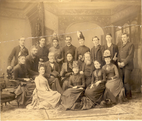As the development of the times demands, more churches are shifting their core pastoral ministry towards building up faith-based families. This story tells how an influential large church in southern Fujian uses their well-established pastoral ministry to build up Christian families and lead the church to achieve unity in their missionary vision.
As one of the three-city downtown central churches in southern Fujian and also the earliest century-old church in the region, Church Q (pseudonym for safety reasons) has rich pastoral power and resources. However, it faces greater ministerial pressure. “Before the pandemic, there were more than 6,000 believers in our church,” said Pastor F, who is in charge. “When everything is resumed this year, we find that the number of our believers decreased significantly.”
Facing a large number of believers as such, learning how to do a fine job in pastoral ministry is a big test for the church. Pastor F said that they built the family ministry by relying on the existing fellowship groups.
As early as the 1990s, Church Q began to build a fellowship ministry. Today, the church has formed a total of 41 fellowships, including choir, pensioners, doctors, etc. In recent years, as large gatherings were greatly declining, the church was determined to repeat their traditional practice, “family ministry," which was the threshing floor of how the church originated.
To this end, since 2022, a vision has come to them, and it is “making every believer shoulder the primary responsibility for making their families Christ-centered.” Church Q stipulates that the construction of Christian families lies in its core pastoral ministry.
“All our fellowships have always paid special attention to systematic bible study and faith practice, but before that, it was mainly to call everyone to participate in church services. However, we now encourage believers to take their families as the first place to practice their faith.” The pastor believes that in the family, believers can see the effect of the practice and the conflicts they face, so as to gradually internalize the Word in the process of receiving, meditating, practicing, and reflecting.
In addition, Church Q also gives laymen the opportunity to approach the daily lives of pastors and see examples of Christian families.
According to the pastor, the church has further refined the leadership ministry of fellowship. That is, more than ten full-time pastoral workers in the church lead the fellowship, and combined with the characteristics of each fellowship, they independently compile the teaching materials for pastoral care. “This requires every pastor to understand the believers deeply, to know what everyone wants and thinks, and to show a true life to the believers.”
In his view, in the early years, believers generally waited for faith more passively, “like being pushed by the church.” However, nowadays, more and more laymen understand that gospel work is not only the duty of the church but also a mission closely related to themselves, which further promotes the vision of the church.
- Translated by Charlie Li












